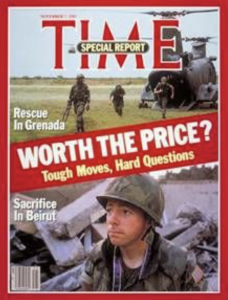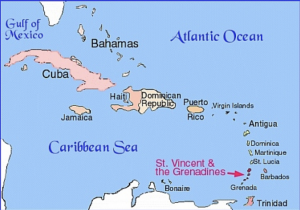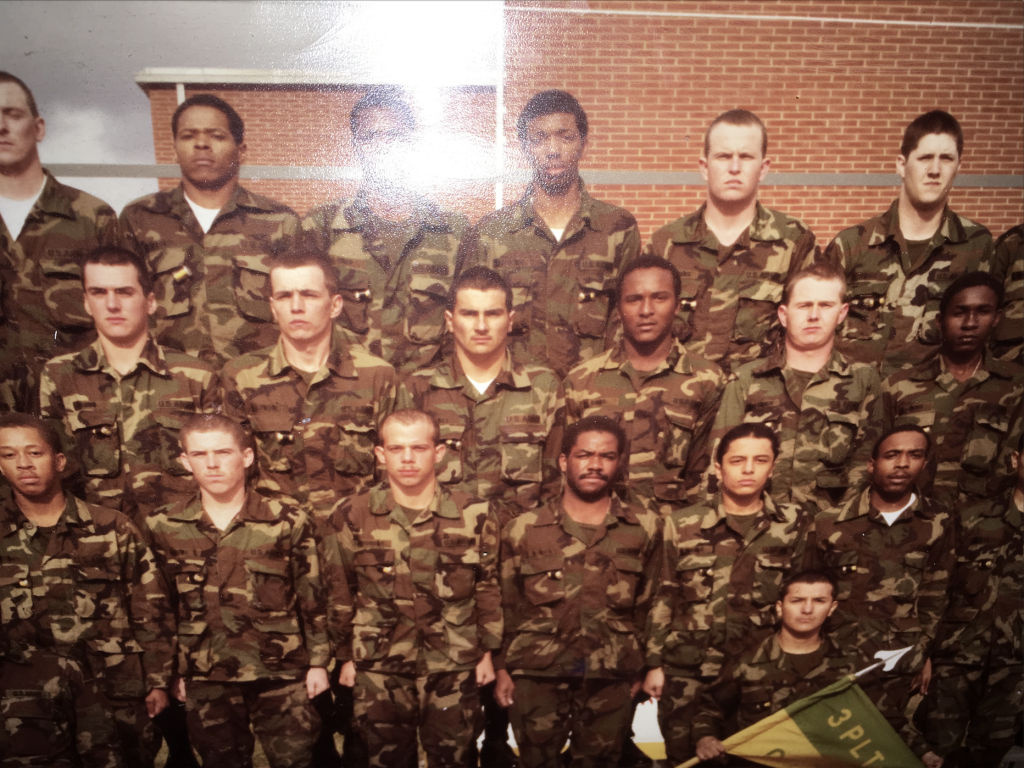Vincent Warzecha
Professor Pinsker
History 118: US History Since 1877
12/8/17
The Scrutiny and Importance of the Invasion of Grenada
Matthew H. Hinds served in the Grenadian war in 1983, 20 years old at the time, in the 2nd Armored Division out of Fort Hood Texas as an E5 sergeant. According to H.W. Brand’s Book, American Dreams, “The invasion took the world aback; most Americans had no idea where Grenada was and no conception of why American soldiers should be landing there.” [1] Hinds landed on October 25th, 1983 with three tanks in his platoon and proceeded through the jungle of Grenada. Matt stated “On our first night, I told my men to not go outside of arm’s length of the tank to do their business. Later that night around 3 a.m. I broke my own rules and went about 5 yards from tank when I heard sticks breaking to my right. I sat under a tree in the brush for about an hour listening and waiting for what I was sure were human footsteps. After an hour two men moved towards the tank and were within 2 feet of me. I had the jump on them and in 2 minutes it was over. I think about this event everyday of my life. [2] The United States’ invasion of Grenada was extremely criticized by the world but was necessary to promote immediate and future safety among American citizens.
On the morning of 25 October 1983, President Ronald Reagan announced that 1,900 U.S. Marines and Army Rangers, joined by 300 troops from six Caribbean states, had launched a predawn assault on the island of Grenada. The president explained that he had ordered the invasion for three reasons: to protect the nearly 1,000 American citizens at Saint George’s University School of Medicine, to “forestall further chaos”, and “to help in the restoration of democratic institutions in Grenada’. [3] When asked if the battle of Grenada was a significant memory in her life, Edwina Wiecek replied “No! I simply remember that Reagan ordered an invasion in Grenada to save the students at the university. After this, multiple people on the other side of Reagan questioned his actions on the news and even ridiculed him. The country was still recovering from the loss of life in the bombing of Beirut.” [4] In fact many people did not know where Grenada was or what the situation was at the time. Matt had “No clue at all…none” of where the island was until his briefing on the way to Grenada. [5] On the way to Grenada he was told “some of Fidel Castro’s guys took over Saint George’s University School of Medicine on the island of Grenada and took American Students as hostage.” [6]. From here Matt’s platoon undertook their mission in the invasion of Grenada.

Time Magazine Cover on Beirut and Grenada
On November 2nd the armed hostilities ceased and peacekeeping missions began. Although the battle only lasted 7 days, the United States forces encountered unexpectedly stiff resistance by Cuban and Grenadian forces, the invading contingent was eventually augmented by approximately 4,000 American troops. [7] After the U.S. army saved the kids from the school Matt’s platoon stayed for 3 weeks. “The armored division cleared out what little armor they had and then the marine recon and their helicopters took care of around 75% of it.. And it was done.. You know a lot of people say the battle of Grenada was five minutes to fight and five weeks to surf because it was so beautiful there”. [8] Alex Warzecha remembers the same depiction of the invasion “When the battle scene was shown on CNN, the island almost seemed like a place for a vacation, not a war ground. The news showed the beautiful coastlines and not a lot of destruction on the island”. [9] The invasion of Grenada was the first time CNN covered a war live on television but not for the first 48 hours of battle due to the distaste for press by military officials after Vietnam. A disconnect between the press and the military created a distaste for the entire operation which led to coverage backed by ridicule. The Washington Post stated on October 26th, 1983, “The invasion of Grenada remained largely a matter for the imagination throughout the day yesterday, as Tv networks made the most of maps, shots of helicopters, and many, many talking heads: at the Pentagon, at the White house, on the hill, at the State Department, on Barbados. [10] The barring of reporters from Grenada quickly turned the news coverage of Grenada towards criticizing the actions of the government including a house hearing on the matter on 3 November, 1983. The media brought up the Bombing of Beirut that occurred just 2 days before the invasion as the reason for invading such a small country in the Caribbean. These accusations are still disputed today. The short takeover of Grenada along with the banning of reporters for 48 hours created much contempt about the entire situation
After the invasion of Grenada the Pentagon reported, 18 American soldiers were killed and 116 were wounded. Cuban forces were estimated to have suffered 24 dead and 59 wounded, while Grenadian military casualties were put at 45 killed and 337 wounded. [11] In a follow-up email interview with Matt, he reported that the Cuban forces killed or wounded were under-reported in order to not report the full Cuban involvement on the island of Grenada. “The U.S. military did not want the media to know of the immediate threat that was among the students at the school”. [12] Matt’s report of additional Cubans on Grenada during the invasion was confirmed in the World News digest in 1983, “As the fighting progressed it became clear that there were more Cubans on Grenada than had been thought.” [13] This is the reason the media was barred from entering the island for 48 hours which led to heavy scrutiny of the government. When asked if the invasion was worth it Matt stated, “Of course it was worth it. Going to help Americans… that’s just it. Part of being a soldier is just doing as you’re told and worrying about the rest of it later.” [14] For Edwina Wiecek, the accusations of the media about the connection of the bombing of Beirut and the invasion of Grenada struck a cord. “I remember questioning if we needed to actually risk our soldiers to take over such a small country that is basically harmless to us.” [15] The aftermath for Grenada was that of peace for the country and Matt even stated “the people did not seem unhappy to see us even though we just beat their army… almost a sense of relief.” [16] A new government was installed in Grenada that promoted democracy and got rid of a chance for communist expansion in the Caribbean.
Reagan invaded Grenada for three reasons, to save the American citizens in the school, to forestall future chaos, and make Grenada a democracy. The invasion of Grenada successfully accomplished these three goals although the way in which it was done was not efficient. The invasion itself was extremely sudden after a huge tragedy for the country which made it easy to question Reagan’s decision and promote the idea of revenge for America. Matt Hinds does not believe this is accurate as well stating “No, I don’t… that’s all politics. Everybody has an opinion but as a soldier you’re told what to do and you do it. But I think we needed to save those kids because Fidel had some of his toughest hardest soldiers there.” [17] The decision to invade Grenada did not originate from revenge but rather Reagan’s effort to stop communism in the Caribbean and forestall a Cuban arms buildup. The invasion also brought back issues between the military and the media that stem from the Vietnam war. This resulted in a cloudy picture to what actually was happening in Grenada and why. “Ladislaus Warzecha (born Jan 23, 1929-died Dec 27, 2014), a Vice president at General Electric for 40 years, once told me the hardest thing he had to do was help President Reagan in the early 80s with Cuban-Soviet crisis and whether to invade or not to invade Grenada. He said this period brought the most stress to his life and is why he was away from home so much.” [18] Ultimately, the invasion of Grenada was a necessary event for the future of the United States and promoted democracy in the world even though it received heavy scrutiny from the world and the media.
Citations
[1] H.W. Brands, American Dreams: The United States Since 1945 (New York: Penguin Books, 2010), 246.
[2] Facetime interview with Matthew Hinds, November 8th, 2017
[3] Rubner, Michael. “The Reagan Administration, the 1973 War Powers Resolution, and the Invasion of Grenada.” Political Science Quarterly 100, no. 4 (1985): 627. doi:10.2307/2151544.
[4] Email Interview with Edwina Wiecek, December 2nd, 2017
[5] Email Interview with Matthew Hinds, December 1st, 2017
[6] [Hinds] Facetime interview
[7] Rubner. 628
[8] [Hinds] Facetime Interview
[9] Email Interview with Alex Warzecha, December 2nd, 2017
[10] Kernan, Michael. “Grenada: The Reaction to the Action.” Washington Post. 26 October 1983: 1. [Historical Newspapers].
[11] Rubner. 628
[12] [Hinds] Email Interview
[13]”U.S., Caribbean States Invade Grenada…World Leaders Condemn Action.” World News Digest. Facts On File News Services, 28 October 1983: 1. [Historical Online Newspapers].
[14] [Hinds] Facetime Interview
[15] [Wiecek] Email Interview
[16] [Hinds] Email Interview
[17] [Hinds] Facetime Interview
[18] [Warzecha] Email Interview
Photo Citations
Ater, Malcolm. GRENADA; Rescued from Rape and Slavery. November 1983.
Luongo, Michael. Rescue in Grenada and Sacrifice in Beirut. November 7th, 1983. Black Star. Grenada and Beirut.
Hinds, Matthew. No name. December 4th, 2017. Matt’s Mantle
Unknown. Map of Caribbean Sea. https://roadslesstraveled.us/grenada/
Selections From Interview Transcripts
-Audio recording with Matt Hinds, Facetime interview, November 8th, 2017
Selected Transcript
From Audio:
Q. What was the buildup to the invasion?
A. “They came to Fort Hood looking for Tank Commanders all NCOs… E5 and above… but they didn’t tell us anything until we were offshore and told us that some of Fidel Castro’s guys took over George Washington University on the island of Grenada and took American students as hostage.
Q. Were you aware of where the island of Grenada was or what the situation was before the briefing?
A. “No, I had no clue at all. None.
Q. How did you and your men feel about the mission? Was it worth it or simply ambiguous?
A. “Of course it was worth it. Going to help Americans… that’s just it. Part of being a soldier is just doing as you’re told and worrying about the rest of it later.
Q. Once you had rescued the kids from the school, did you leave right away or did you stay to make sure there was stability?
A. We stayed for 3 weeks.. You know… it wasn’t long. We had cleared out what little armor they had and then the marine recon and their helicopters took care of around 75% of it.. And then it was done.. You know alotta people say the battle of Grenada was five minutes to fight and five weeks to surf because it’s beautiful there.
Q. Clarification, You don’t think Beirut had anything to do with going into Grenada?
A. No, I don’t… that’s all politics. Everybody has an opinion but as a soldier you’re told what to do and you do it. But I think we needed to save those kids because Fidel had some of his toughest hardest soldiers there.
-Email Interview, With Matthew Hinds, December 1st, 2017
Selected Transcript
From Email:
Q. Can you tell me what happened on your first night?
A. On our first night, I told my men to not go outside of arm’s length of the tank to do their business. Later that night around 3 a.m. I broke my own rules and went about 5 yards from tank when I heard sticks breaking to my right. I sat under a tree in the brush for about an hour listening and waiting for what I was sure were human footsteps. After an hour two men moved towards the tank and were within 2 feet of me. I had the jump on them and in 2 minutes it was over. I think about this event everyday of my life.
Q. What forces did you encounter personally?
A. We encountered Castro’s top forces. Actually son… we were told to not report all of the casualties. The U.S. military did not want the media to know of the immediate threat that was among the students at the school.
Q. What did the Grenadian citizens do when the battle was complete?
A. The people did not seem unhappy to see us even though we just beat their army… almost a sense of relief.
-Email Interview with Edwina Wiecek, December 2nd, 2017
(Grandmother)
Selected Transcript
From Email:
Q. What do you recall from the invasion of Grenada?
A. No! I simply remember that Reagan ordered an invasion in Grenada to save the students at the university. After this, multiple people on the other side of Reagan questioned his actions on the news and even ridiculed him. The country was still recovering from the loss of life in the bombing of Beirut.
Q. Do you remember the news covering linking the invasion of Grenada and the bombing of Beirut?
A. I remember questioning if we needed to actually needed to risk our soldiers to take over such a small country that is basically harmless to us.
-Email Interview with Alex Warzecha, December 2nd, 2017
(Mother)
Selected Transcript
From Email:
Q. What do you remember from the invasion of Grenada on the news?
A. When the battle scene was shown on CNN, the island almost seemed like a place for vacation, not a war ground. The news showed the beautiful coastlines and not a lot of destruction on the island
Q. Do you remember anything that Gramps told you or dad about the invasion of Grenada?
A. Gramps once told Dad and I the hardest thing he had to do was help President Reagan in the early 80s with Cuban-Soviet crisis and whether to invade or not to invade Grenada. He said this period brought the most stress to his life and is why he was away from home so much.




Leave a Reply